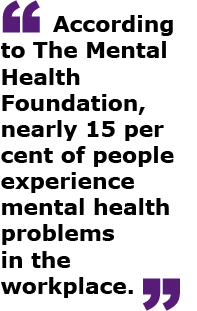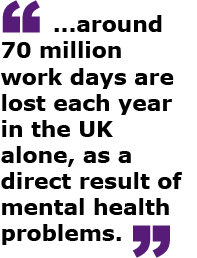Workplace dilemmas: how do I help my colleague through mental illness?
Our resident agony uncle offers wisdom about your workplace woes. This time: how to help a colleague with mental illness
Dear Tim,
For the last five years, I’ve had the privilege of sitting alongside a wonderful colleague. He’s a fantastic man: kind, funny, usually very gregarious and extremely efficient.
 From time to time, like us all I suppose, he gets a bit stressed. Sometimes it’s a pressing deadline, or a run-in with management. Occasionally he’ll have a moan about something apparently trivial, like the cleanliness of the gents’ loos or the staff kitchen. But it’s usually done with a fair amount of humour, and he soon gets over it.
From time to time, like us all I suppose, he gets a bit stressed. Sometimes it’s a pressing deadline, or a run-in with management. Occasionally he’ll have a moan about something apparently trivial, like the cleanliness of the gents’ loos or the staff kitchen. But it’s usually done with a fair amount of humour, and he soon gets over it.
Recently, though, I’ve noticed a change in him. I find he gets worked up about things far more frequently – and often with no good cause. To give an example, the other day he berated one of his team for misspelling a client’s name in a draft letter. Usually, he’d gently point out their mistake and then move on, but this time he was ranting and raving for ages. It was all a bit embarrassing, to be honest.
My biggest concern is that he’s become very withdrawn. Like many workplaces, we have a tradition of Friday afternoon beers. The fridge is loaded with a few bottles of lager and we finish a bit early and gather in the kitchen. It lasts about an hour, and my colleague always used to come along. He’d get involved with office socials, too, and enjoyed chatting about the latest TV shows or movies during lulls in the workload.
 He’s not up for any of that now. He comes into the office early and spends most of the day focused on his work. His only interactions are about work stuff, and even then he’s reluctant to chat. He rarely contributes in meetings, unless he’s asked a question directly.
He’s not up for any of that now. He comes into the office early and spends most of the day focused on his work. His only interactions are about work stuff, and even then he’s reluctant to chat. He rarely contributes in meetings, unless he’s asked a question directly.
I’ve tried talking to him about this, because I’m worried that his mental health is fragile. He told me a few years ago that his mother had a nervous breakdown in her forties, and I know he was worried that it may be genetic. He’s just turned 40. But the trouble is, whenever I try to have a chat with him, he closes down. We even arranged to go for a coffee one afternoon, but he cancelled at the last minute, saying he’d sooner go when he was “more himself”.
I don’t want to crowd him or make a meal out of it. But I am worried about him and want to help in any way I can. Do you have any advice about the best way of showing support, without making things worse?
Reply:
Good on you for showing such concern for a colleague. According to The Mental Health Foundation, nearly 15 per cent of people experience mental health problems in the workplace. And while evidence suggests that women are twice as likely as men to suffer from such conditions, it’s still the case that more than 10 per cent of male workers have a mental illness at some point.
In other words: this is a common difficulty, and men are by no means immune. As well as the emotional cost, there’s an economic one: around 70 million work days are lost each year in the UK alone, as a direct result of mental health problems. So it’s in employers’ interests to tackle this problem, for both social and financial reasons.
 It does sound very much like your workmate is struggling. Of course, his travails may not be work-related. It’s interesting that you’ve drawn a connection between his mother’s challenging mental health in her forties and his recent birthday.
It does sound very much like your workmate is struggling. Of course, his travails may not be work-related. It’s interesting that you’ve drawn a connection between his mother’s challenging mental health in her forties and his recent birthday.
There is some evidence to suggest that certain mental health problems are hereditary, and the list includes clinical depression and bipolar disorder. But it could just as easily be the case that your colleague is worried about reaching the early years of middle age, with all the anxiety that can bring. And the fact his mother suffered form mental illness at a similar age is just serving to exacerbate his concerns.
Whatever the cause, it’s important to be there for your colleague, but, as you rightly say, not to crowd him. The Samaritans website is a great source of insight around the symptoms of mental health problems, including depression, and ways to behave with people who are suffering from them.
The advice is to give the person an opportunity to talk about their concerns, but not to pressure them. If they do want to chat, you should be caring, patient, and compassionate. Use open questions to elicit information about how they’re feeling, and repeat what you hear so they have a chance to test it out and refine it. It’s a big ask, but you’ll be doing your friend a massive favour simply by being there.
If it all gets too much, or you’re worried that his illness is worsening, you should ask for help. Don’t betray any confidences, but do mention to your colleague’s manager, or to HR, that you have concerns. The company will have processes in place to deal with this very situation.
As I say, your care and concern is laudable. Be there for your colleague if you can. But remember: you also need to look after yourself. Carrying another’s burdens takes a toll, so be sure to have appropriate support as you try to help your colleague through this difficult time.
Published: 18 March 2019
© Copyright Just Recruitment 2019
If you enjoyed reading this, you may also like – How to compliment colleagues: a five-step guide
You may also like to read – Do I compete against my career mentor for promotion?

